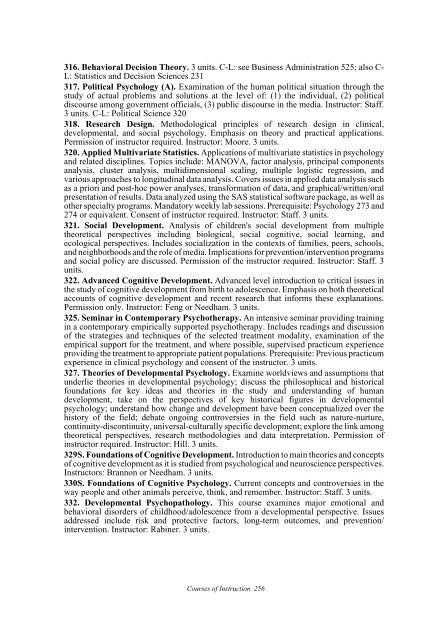Duke University 2008-2009 - Office of the Registrar - Duke University
Duke University 2008-2009 - Office of the Registrar - Duke University
Duke University 2008-2009 - Office of the Registrar - Duke University
You also want an ePaper? Increase the reach of your titles
YUMPU automatically turns print PDFs into web optimized ePapers that Google loves.
316. Behavioral Decision Theory. 3 units. C-L: see Business Administration 525; also C-<br />
L: Statistics and Decision Sciences 231<br />
317. Political Psychology (A). Examination <strong>of</strong> <strong>the</strong> human political situation through <strong>the</strong><br />
study <strong>of</strong> actual problems and solutions at <strong>the</strong> level <strong>of</strong>: (1) <strong>the</strong> individual, (2) political<br />
discourse among government <strong>of</strong>ficials, (3) public discourse in <strong>the</strong> media. Instructor: Staff.<br />
3 units. C-L: Political Science 320<br />
318. Research Design. Methodological principles <strong>of</strong> research design in clinical,<br />
developmental, and social psychology. Emphasis on <strong>the</strong>ory and practical applications.<br />
Permission <strong>of</strong> instructor required. Instructor: Moore. 3 units.<br />
320. Applied Multivariate Statistics. Applications <strong>of</strong> multivariate statistics in psychology<br />
and related disciplines. Topics include: MANOVA, factor analysis, principal components<br />
analysis, cluster analysis, multidimensional scaling, multiple logistic regression, and<br />
various approaches to longitudinal data analysis. Covers issues in applied data analysis such<br />
as a priori and post-hoc power analyses, transformation <strong>of</strong> data, and graphical/written/oral<br />
presentation <strong>of</strong> results. Data analyzed using <strong>the</strong> SAS statistical s<strong>of</strong>tware package, as well as<br />
o<strong>the</strong>r specialty programs. Mandatory weekly lab sessions. Prerequisite: Psychology 273 and<br />
274 or equivalent. Consent <strong>of</strong> instructor required. Instructor: Staff. 3 units.<br />
321. Social Development. Analysis <strong>of</strong> children's social development from multiple<br />
<strong>the</strong>oretical perspectives including biological, social cognitive, social learning, and<br />
ecological perspectives. Includes socialization in <strong>the</strong> contexts <strong>of</strong> families, peers, schools,<br />
and neighborhoods and <strong>the</strong> role <strong>of</strong> media. Implications for prevention/intervention programs<br />
and social policy are discussed. Permission <strong>of</strong> <strong>the</strong> instructor required. Instructor: Staff. 3<br />
units.<br />
322. Advanced Cognitive Development. Advanced level introduction to critical issues in<br />
<strong>the</strong> study <strong>of</strong> cognitive development from birth to adolescence. Emphasis on both <strong>the</strong>oretical<br />
accounts <strong>of</strong> cognitive development and recent research that informs <strong>the</strong>se explanations.<br />
Permission only. Instructor: Feng or Needham. 3 units.<br />
325. Seminar in Contemporary Psycho<strong>the</strong>rapy. An intensive seminar providing training<br />
in a contemporary empirically supported psycho<strong>the</strong>rapy. Includes readings and discussion<br />
<strong>of</strong> <strong>the</strong> strategies and techniques <strong>of</strong> <strong>the</strong> selected treatment modality, examination <strong>of</strong> <strong>the</strong><br />
empirical support for <strong>the</strong> treatment, and where possible, supervised practicum experience<br />
providing <strong>the</strong> treatment to appropriate patient populations. Prerequisite: Previous practicum<br />
experience in clinical psychology and consent <strong>of</strong> <strong>the</strong> instructor. 3 units.<br />
327. Theories <strong>of</strong> Developmental Psychology. Examine worldviews and assumptions that<br />
underlie <strong>the</strong>ories in developmental psychology; discuss <strong>the</strong> philosophical and historical<br />
foundations for key ideas and <strong>the</strong>ories in <strong>the</strong> study and understanding <strong>of</strong> human<br />
development, take on <strong>the</strong> perspectives <strong>of</strong> key historical figures in developmental<br />
psychology; understand how change and development have been conceptualized over <strong>the</strong><br />
history <strong>of</strong> <strong>the</strong> field; debate ongoing controversies in <strong>the</strong> field such as nature-nurture,<br />
continuity-discontinuity, universal-culturally specific development; explore <strong>the</strong> link among<br />
<strong>the</strong>oretical perspectives, research methodologies and data interpretation. Permission <strong>of</strong><br />
instructor required. Instructor: Hill. 3 units.<br />
329S. Foundations <strong>of</strong> Cognitive Development. Introduction to main <strong>the</strong>ories and concepts<br />
<strong>of</strong> cognitive development as it is studied from psychological and neuroscience perspectives.<br />
Instructors: Brannon or Needham. 3 units.<br />
330S. Foundations <strong>of</strong> Cognitive Psychology. Current concepts and controversies in <strong>the</strong><br />
way people and o<strong>the</strong>r animals perceive, think, and remember. Instructor: Staff. 3 units.<br />
332. Developmental Psychopathology. This course examines major emotional and<br />
behavioral disorders <strong>of</strong> childhood/adolescence from a developmental perspective. Issues<br />
addressed include risk and protective factors, long-term outcomes, and prevention/<br />
intervention. Instructor: Rabiner. 3 units.<br />
Courses <strong>of</strong> Instruction 256









